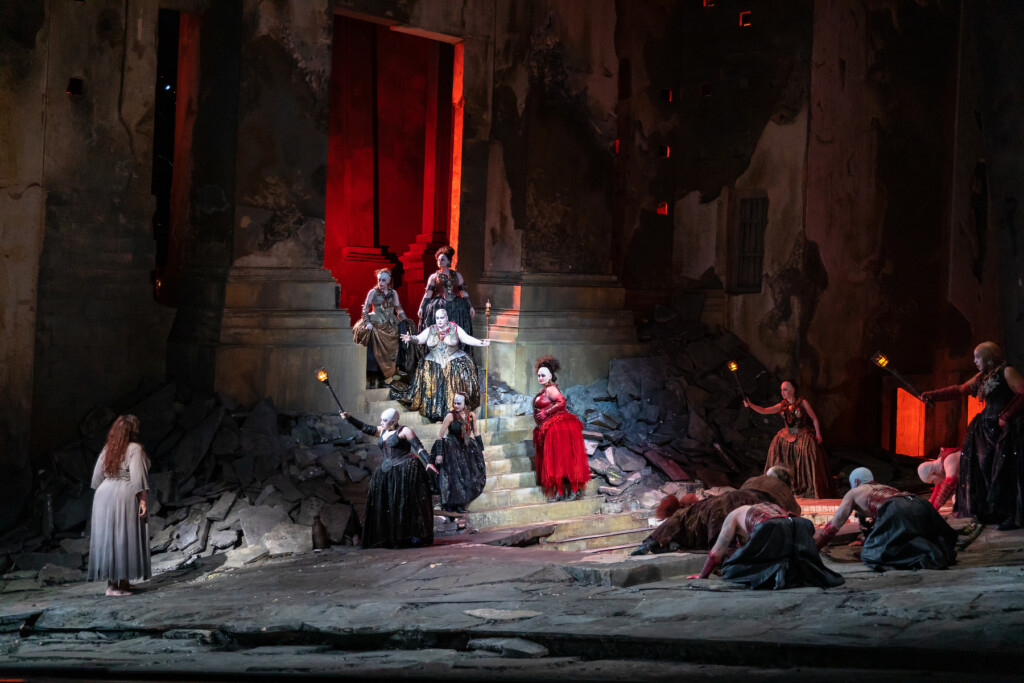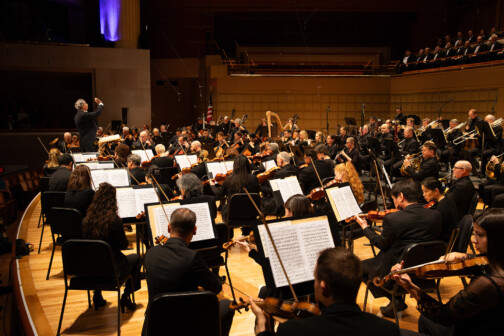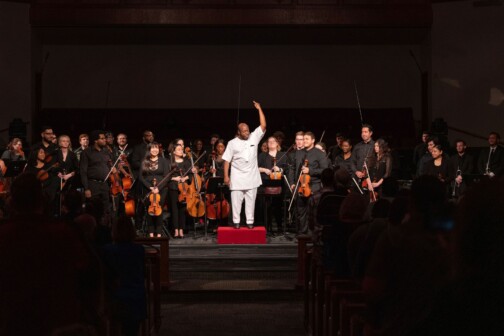The timing is surely not intentional. You can hardly imagine that the Dallas Opera’s first choice was to program Romeo and Juliet in late spring and to present, on Valentine’s Day, a chilling story of children plotting the murder of their mother. Whatever. There’s too much romance in the air these days. Elektra is a much older, more sinister potion: that of revenge and righteousness. One of the characters vows that “the blood of a hundred slashed throats will pour into your grave.”
The opera, composed by Richard Strauss in 1909 and last performed in Dallas nearly 30 years ago, is a taut 90-minute closeup of Electra and her family. Taken from ancient Greek legends around the Trojan War, the story foreshadows that of Hamlet. Electra’s mother, Clytemnestra, has murdered her father, Agamemnon, and taken up with a lover, Aegisthus. Electra’s mind has become twisted with ideas of revenge and murder against Clytemnestra and Aegisthus, but because she doesn’t feel able to enact them herself, she waits—perhaps in vain—for her brother Orestes to come home from battle and finish the job. (The opera’s title spells Elektra with a k because it is sung in German, with slightly different character names.)
That’s the story, and it’s enough story for 90 minutes because Strauss and librettist Hugo von Hofmannsthal take time to zoom in on the psychological states of every character. Electra is onstage, in the Dallas Opera’s version, for every single minute. But her murderous mother and her more innocent sister, Chrysothemis, also get extended opportunities to unburden their souls.
Everything about the Opera’s production of Elektra, originally directed by David McVicar and in this revival directed by Nick Sandys, is calculated to unsettle. Aside from Electra and her sister, the other women are all bald, with unnaturally white gleaming skin. The costuming—again, aside from Electra’s plain rags—calls to mind Mad Max: Fury Road, or perhaps a fetish ball directed by Baz Luhrmann. Even the set itself is askew. The front doesn’t quite face the audience directly, and one of the buildings in the background is leaning forward, as if it’s been frozen in the middle of falling to ruin. The centerpiece onstage is a ruin, an abandoned ancient bath with tiles strewn about. Combined with Clytemnestra’s employment of a bare-buttocked court jester, the set suggests a court in such decadence it can’t maintain itself anymore.
Strauss’ music achieves the same chills through the use of an absolutely massive orchestra. Even a former band geek who doesn’t love opera would enjoy spending Elektra watching the orchestra pit, so crammed full of musicians (nearly 100) that flutists have to avoid hitting each other in the face with their instruments. The music, depending heavily on unsettling discordant intervals, reflects Electra’s disturbed mind—and at times becomes graphic in its descriptive power. (Listen to the weirdly fluttering woodwinds when a character mentions demon birds with long beaks.)
Elektra’s gruesome reputation as one of the bleakest and bloodiest of all operas is slightly misleading. Yes, most of the characters will die by the end—but mostly offstage. (Sorry!) Instead, the opera’s most insistent violence is psychological. At least twice, Electra turns away from the people she still loves—or still should love—because her mind is so poisoned by her need for vengeance. If the unchanging stage and its small cast of characters feel claustrophobic, that’s because the emotions here are claustrophobic: nobody is capable of change. Even the music briefly gets its hopes up at certain moments, unfurling into gorgeous romantic melodies as if to show that beauty is possible. But not for long.
Here I’ll admit that I hadn’t seen Elektra staged before, but as best I can tell, the Dallas Opera’s production is almost totally beyond reproach. Marjorie Owens, in her first performance of the title role, has to hold our attention for the length of a movie without a single break, while singing loudly enough to be heard over the enormous orchestra, and she succeeds with panache. Her role is so demanding that the set constructors have left her a disguised water bottle onstage. The directors also seem to have helped by changing the ending, in which Electra is meant to dance herself to death in a frenzy, to a more muted demise.
Jill Grove makes Clytemnestra’s worldview clear and her feelings of guilt sympathetic, despite the garish makeup and dystopian costumery. She is plausible both as murderer and penitent. Alfred Walker, in a role the existence of which I guess could be considered a spoiler for newcomers, is instantly endearing and charismatic.
Even more astonishing is the orchestra, which plays a lead role from start to finish, its parts often seemingly unrelated to the singers’. Emmanuel Villaume leads with clear, concise gestures and body language and elicits extraordinary playing. The first thing a first-time listener will notice is the deep, wide-ranging brass section, but there are also innumerable woodwind instruments (some obscure: bass oboe, heckelphone, three kinds of clarinet) that Villaume makes sure are not drowned out in the din.
Elektra is a chiller, and there are two performances remaining: one right on Valentine’s itself—now there’s a temptation—and the final night this Saturday. Saturday’s performance will also be livestreamed, and you can catch it on your device for a princely $10. Don’t miss it. After the final curtain falls on this cold-blooded tragedy, maybe you’ll feel a little more appreciation for your loved ones. Or maybe you’ll recognize a little, dark, secret corner of yourself.
Author







